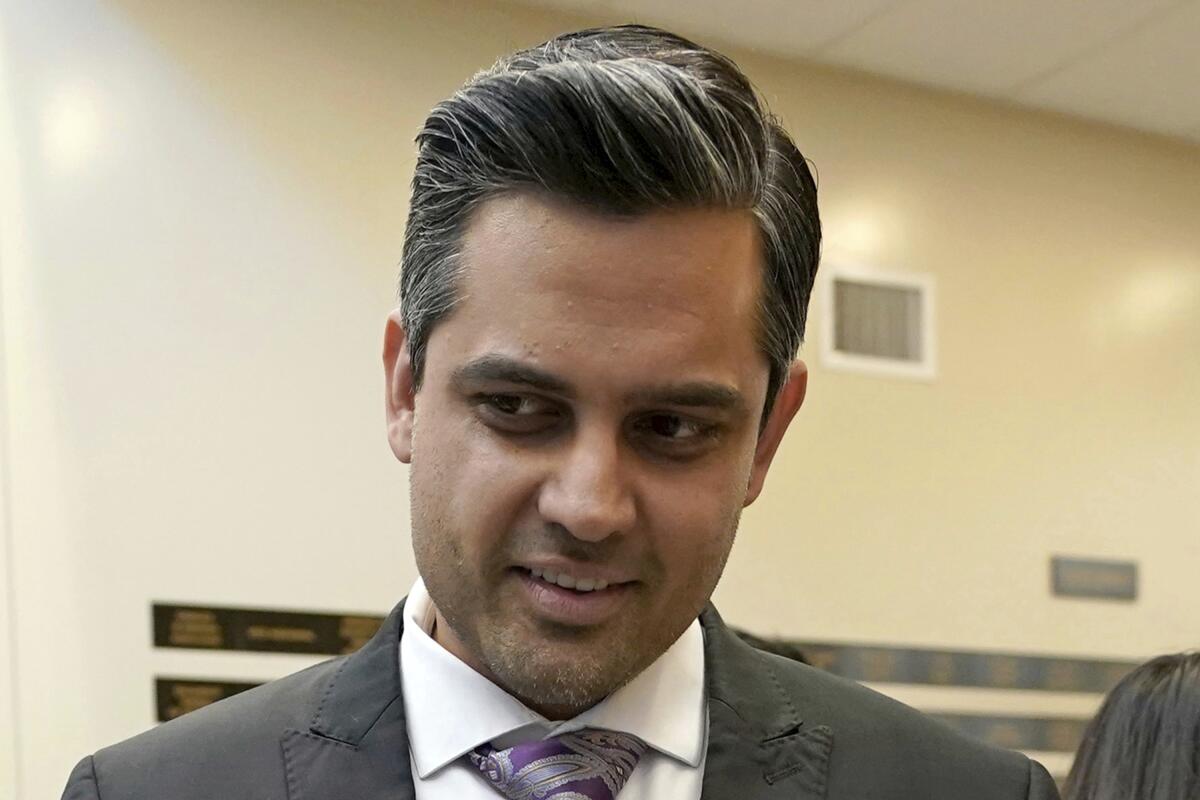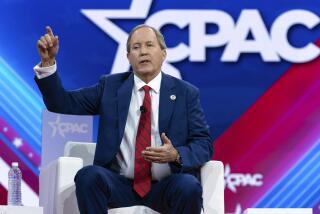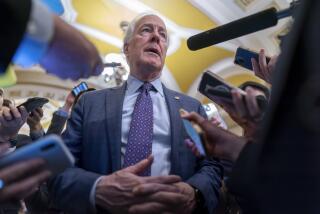Descendant of Sam Houston hopes to be the first Indian American elected to Congress from Texas

After stopping at two Baptist churches on Sunday, Sri Preston Kulkarni changed from a business suit into a collarless shirt, or kurta, and slipped off his shoes to enter a Jain temple in the rapidly diversifying suburban Houston district he hopes to represent.
“I was the first Indian American nominated to run for Congress from Texas,” he told the temple crowd of several hundred eating vegan curry after services. “Hopefully, I will be the first elected.”
Kulkarni, 41, a former diplomat, is running for an open seat in Texas’ 22nd Congressional District as a Democrat — and experts give him a strong chance of taking it, after Democrats flipped two Republican-held House seats in the 2018 midterm election.
The Republican field is split: Pierce Bush, 33, a grandson of President George H.W. Bush and a nephew of President George W. Bush, faces a tough 15-candidate primary in which he’s seen as a moderate. The two other front-runners in that primary are vocal Trump supporters: Former local Sheriff Troy Nehls and Republican donor Kathaleen Wall, who bills herself as “The Wall who will help Donald Trump build a wall!”
Bush, chief executive of the largest Big Brothers Big Sisters affiliate in the country, has recently expressed support for Trump immigration policies in campaign ads, but is probably headed to a runoff — if he makes it that far. The Cook Political report considers the race a Republican toss-up.
“Pierce Bush is in a very tight race,” said Mark P. Jones, a political scientist at Rice University. “The Republican Party realizes it’s in some trouble. Trump is a liability across the state of Texas, but he is especially a liability in Texas 22 because he has pushed a lot of Asian Americans, Indian Americans, away from voting Republican.”
Democrats are still a long way from turning Texas blue — or even purple. It’s still a largely red state, but Democrats have made inroads in Texas’ fast-growing cities and suburbs.
Last year’s congressional election saw some major Republican upsets as incumbents lost to moderate Democrats in suburban Houston and Dallas districts long considered safe. In December, a Republican state representative, Rick Miller, dropped his bid for reelection after comments he made to the Houston Chronicle disparaging two Asian opponents sparked controversy, and Republican Gov. Greg Abbott withdrew his endorsement.
When Kulkarni ran for the same seat against incumbent Pete Olson in 2018, he drove Asian American turnout and came within about 14,000 votes, or 4.9 percentage points, of winning. Olson is not seeking reelection to the seat, which he has held since 2009.
The district has nearly a million residents. Two-thirds live in Fort Bend County, which is about 65% minority, divided about equally among Asian Americans, African Americans and Latinos. Last year, K.P. George was elected county executive, making him one of the top Indian American elected officials in the United States. But turnout among many immigrants communities has historically been low.
“It’s not a red district — it’s a non-voting district,” said Kulkarni’s campaign manager, Allen Chen, a Thousand Oaks, Calif., native who managed similar micro-targeting of Asian American communities in Orange County during Gil Cisneros’ congressional campaign.
As the district grows, it is becoming more Democratic. Trump won it by 8 percentage points in 2016, but that was 17.5 points less than Mitt Romney in 2012.
“There is definitely a worry among Republicans that if they move too far to the right, they will lose not only this seat, but the Texas suburbs,” said Brandon Rottinghaus, a political scientist at the University of Houston.
Kulkarni — who speaks Hebrew, Hindi, Mandarin, Spanish and Russian — estimates residents speak more than a hundred languages. He’s distributed materials in 19 languages — several of them South Asian — and visited temples, mosques and other community centers.
After Sunday’s temple visit, Kulkarni returned to his campaign headquarters in nearby Stafford to record a video with a Democratic city councilwoman, Alice C. Chen.
“United is power!” they chanted together in Mandarin as a photographer from the local Nepali newspaper looked on.
Chen had already arranged to post the video on a local Chinese-language news site, and the campaign has been doing outreach to Chinese American voters on WeChat.
Chen joined campaign volunteers Sunday to back Kulkarni. “He knows your culture,” she said. “He understands the needs of the community.”
Kulkarni grew up in Houston and graduated from the University of Texas at Austin, spent 14 years in the Foreign Service and worked for Sen. Kirsten Gillibrand (D-N.Y.) before earning a master’s degree at the Harvard Kennedy School. His late father was an Indian immigrant, his mother a descendant of one of the Anglo founders of Texas.
“I tell people the first immigrant in my family wasn’t my dad. It was Sam Houston, because he came here from Mexico,” Kulkarni said of his ancestor, the city’s namesake, who arrived when Texas was still Mexico and helped it become part of the U.S.
Kulkarni believes Fort Bend looks the way Texas and America will one day. But he acknowledged that even with his language skills and personal history, trying to form a coalition in such a diverse community has been challenging.
At the Jain temple on Sunday, many of the Indian Americans he met were conservative Republicans. They questioned him about abortion and gun rights, as well as the contested Kashmir region of India that borders Pakistan.
Kulkarni — who is Hindu — appealed to the shared Jain, Hindu and Buddhist belief in ahimsa, nonviolence and respect for others.
“There is so much division in the United States right now,” he told the crowd. “Ahimsa is needed more than ever.”
More to Read
Start your day right
Sign up for Essential California for news, features and recommendations from the L.A. Times and beyond in your inbox six days a week.
You may occasionally receive promotional content from the Los Angeles Times.







